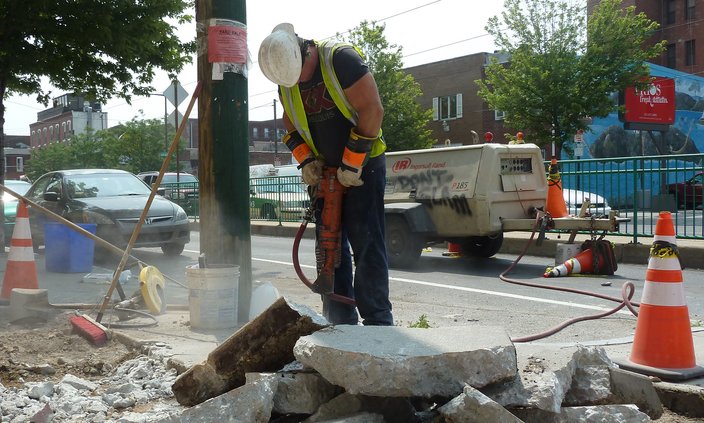
July 18, 2019
The Philadelphia Department of Health has declared a heat health emergency through 11 p.m. Sunday due to extremely hot weather. You can find Cooling Centers, pools, spraygrounds, recreation centers, libraries with extended hours, and older adult centers on this interactive map. For help, call the Philadelphia Corporation for Aging's heatline at (215) 765-9040 from 8:30 a.m. to midnight daily. It will be active through 11 p.m. Monday.
Here's a list of more tips to keep safe and stay cool during the heat spell:
• Stay hydrated by drinking plenty of water throughout the day
• Avoid caffeinated drinks like soda and tea, and alcohol (they can dehydrate you)
• Use a fan with the windows open or an air conditioner
• Visit places like the library, shopping centers, movie theaters or senior centers that have air conditioning. Oak Street Health is operating cooling centers from 9 a.m. to 5 p.m. from Wednesday, July 17, 2019 through Sunday July 21, 2019. Click here for specific hours for each center.
• Shower or bathe in water that is near skin temperature.
• Avoid being outside during the hottest times of the day (noon to 6 p.m.)
• Try to rest in the shade to keep cool
• Wear sunscreen, lightweight, loose‐fitting clothing, sunglasses and a wide‐brimmed hat or visor
• Take an umbrella for shade
• Know the symptoms of heat exhaustion and heatstroke. If someone is experiencing cramps in the legs or abdomen, get them to a cooler place, have them rest, stretch the affected muscle and re-hydrate (about four ounces of cool water every 15 minutes). If someone is showing signs of heat exhaustion (cool, moist, pale or flushed skin; heavy sweating; headache; nausea; dizziness; weakness; or exhaustion), move them to a cooler place, remove or loosen tight clothing and spray the person with water, or apply cool, wet cloths or towels to the skin. Fan the person. If they are conscious, give small amounts of water to drink slowly. Watch for changes in condition. If the person refuses water, vomits or begins to lose consciousness, call 911.
• Older people and those with pre‐existing medical conditions are at greater risk for health problems
• Visit older friends, relatives and neighbors – especially those you know have medical problems – to make sure that air conditioners or fans are working and homes are adequately ventilated
• Seniors should seek help if they experience lightheadedness, heat cramps, heavy sweating, thirst, faintness, confusion or nausea.
• Never leave seniors, children or pets alone in a car
• Be sure pets have plenty of cool water to drink, and are kept out of the sun (see more tips below)
Mike Breslin of Northeast Philadelphia jackhammers a sidewalk at Fourth Street and Girard Avenue in Olde Kensington during a 2015 heat wave.
The Occupational Safety and Health Administration (OSHA) reminds employers to protect workers from heat illness. If a job requires working long hours outdoors, employers should take necessary precautions to keep workers safe – providing frequent water breaks, shaded areas and enough time to rest.
The nonprofit Philadelphia Corporation for Aging's Heatline – 215-765-9040 – is an extended version of its Helpline that provides additional help for seniors feeling the heat.
When activated, the Philadelphia Department of Health provides trained staff who answer questions about the heat and how to detect signs of heat stress. Mobile teams are ready to respond to situations needing intervention. The Heatline operates from 8:30 a.m. to midnight and on weekends.
During severe heat waves, the Camden County Freeholder Board may be distributing free fans to residents age 60 and older with an income of $25,000 or less. To request a fan or get information, call the Camden County Division of Senior Services at (856) 858-3220.
PETA offers the following suggestions for safeguarding animals during hot weather:
• Keep dogs indoors: Unlike humans, dogs can only sweat through their footpads and cool themselves by panting. Soaring temperatures can cause heat stress, injury, or death.
• Provide water and shade: When outside, animals must have access to fresh water and ample shade, and the shifting sun needs to be taken into account. Even brief periods of direct exposure to the sun can have life-threatening consequences.
• Walk — don't run: In very hot, humid weather, never exercise dogs by biking and making them run alongside you or by running them while you jog. Dogs will collapse before giving up, at which point, it may be too late to save them.
• Avoid hot cars: Never leave an animal in a parked car in warm weather, even for short periods with the windows partially rolled down. Dogs trapped inside hot cars can succumb to heatstroke within minutes – even if a car isn't parked in direct sunlight.
• Stay alert and save a life: Keep an eye on all outdoor animals. Make sure that they have adequate water and shelter. If you see an animal in distress, provide him or her with water for immediate relief and contact humane authorities right away.
• Avoid hot pavement: When outdoor temperatures reach the 80s, asphalt temperatures can reach 140 degrees, causing pain, burns, permanent damage, and scarring on dogs' paws after just a few minutes of contact. Walk on grass when possible, and avoid walking in the middle of the day.
• Use a cooling vest or mat: Dog cooling equipment, such as wearable vests or bed mats, come in a range of materials and prices and help prevent overheating. Simply freeze or soak the items in cold water to keep dogs comfortable while on a walk or lounging. Placing cold water bottles in a dog's bed also works.
Sources: American Red Cross, Philadelphia Department of Public Health; Camden County Freeholders; PETA.
 Bob McGovern, File/PhillyVoice
Bob McGovern, File/PhillyVoice